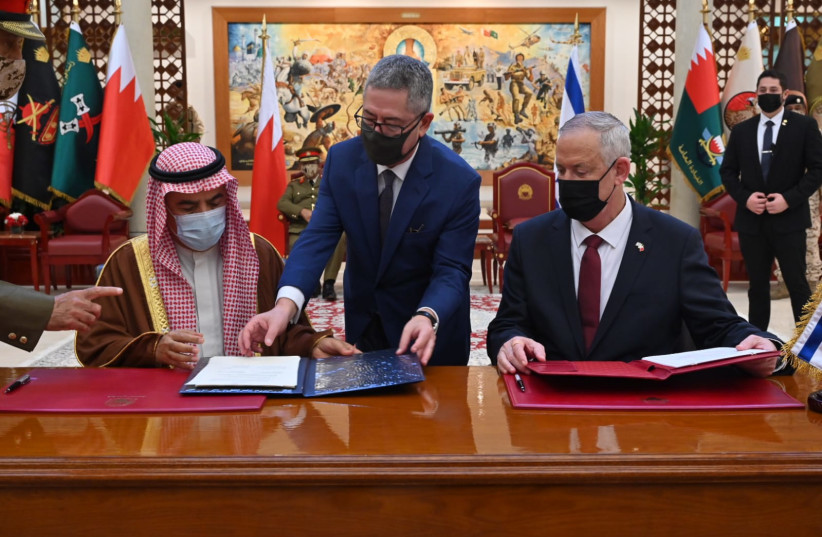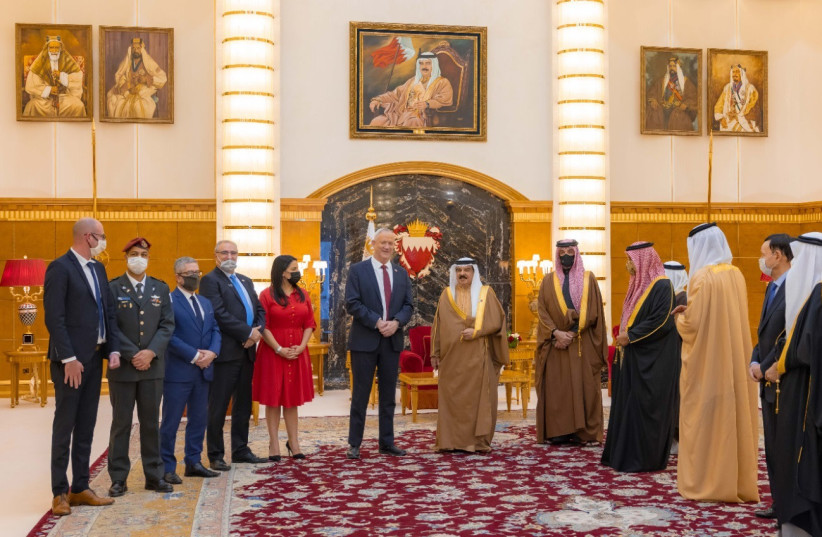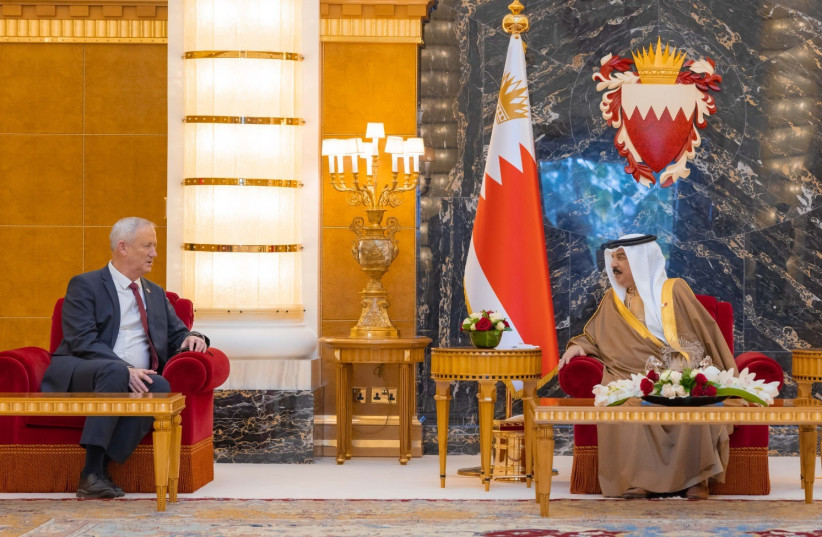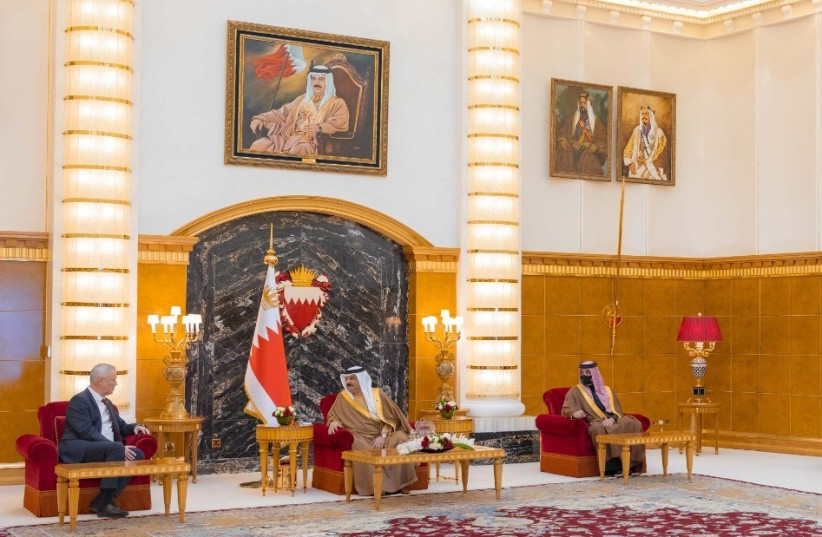Defense Minister Benny Gantz met with King Hamad bin Isa al-Khalifa and signed a historic public Memorandum of Understanding (MoU) with the Kingdom of Bahrain on Thursday, officially establishing security ties between the two Middle Eastern countries.
The MoU was signed at the Bahrani Defense Headquarters in Manama with his Bahraini counterpart, Minister of Defense Affairs Lt.-Gen. Abdullah Bin Hassan Al Nuaimi, and the kingdom’s Commander-in-Chief Field Marshal Sheikh Khalifa bin Ahmed Al Khalifa.
The agreement will set a solid security cooperation framework that formalizes defense relations between the two countries, allowing for increased cooperation in various fields such as intelligence sharing, military-to-military training, cooperation between defense industries and more.
At the ceremony, Gantz, who was joined by Political-Military Bureau Director Zohar Plati, called the MoU a “significant security agreement” that will allow for extensive cooperation and will strengthen the security of both countries.
“We have reached new heights today in Israel-Bahrain relations with the important meetings that took place and with the signing of the historic MoU,” he said. “We are building on the groundbreaking Abraham Accords and deepening ties between our nations. Only one year following the signing of the accords, we have achieved an important defense agreement, which will contribute to the security of both countries and the stability of the region.”

Following the ceremony, Gantz was given a sword from the Persian Gulf country.
Gantz then met with the king at the royal palace as well as the heir to the throne, Crown Prince and Prime Minister Salman bin Hamad bin Isa Al Khalifa, and other senior Bahraini officials.
During the visit where he was received by an official honor guard, Gantz “conveyed the importance of the Israeli-Bahraini relationship” and extended his appreciation for the King’s support for the “expansion of ties,” highlighting the MoU as a great achievement, his office said in a release.
Ganz thanked the king for his hospitality during the visit and said the expansion of ties between the two countries is not only reflected in the economic and civil agreements that have been signed in the past two years, but also now that are being signed, regarding security and defense.
Speaking to reporters following the ceremony, Gantz said the decision to go public with the MoU was “a significant decision, a move that matures over time. These are ties that the defense establishment built over the years and it is a historic moment to make them official and public.”
He said Bahrain is a country “that stands on its own” and one that Israel “wants and needs” to develop relations with in all matters in order to address the operational needs of both countries, civilian as well as military.
“A dialogue and increased industry collaborations will now begin, and we will reach solutions for the relevant needs of the Bahrainis,” he said. “This is exactly the essence of the agreement, that we sit together, form working groups and find concrete solutions.”
According to Gantz, the “moderate camp” in the region “needs to be strengthened. Formal relations allow us to come together and act in the face of shared threats. We are only a year since the signing of the Abraham Accords, and in the next decade there will be more significant developments.”
Speaking to reporters following the ceremony, Gantz said that the decision to go public with the MoU “is a significant decision, a move that matures over time. These are ties that the defense establishment built over the years and it is a historic moment to make them official and public.”
He said that Bahrain is a country “that stands on its own” and one that Israel “wants and needs” to develop relations with all matters in order to address the operational needs of both countries, both civilian and military.

“A dialogue and increased industry collaborations will now begin, and we will reach solutions for the relevant needs of the Bahrainis,” he said. “This is exactly the essence of the agreement, that we sit together, form working groups and find concrete solutions.”
According to Gantz, the “moderate camp” in the region “needs to be strengthened. Formal relations allow us to come together and act in the face of shared threats. We are only a year since the signing of the Abraham Accords and in the next decade there will be more significant developments.”
Gantz also visited the US Navy’s Fifth fleet on Thursday during his historic visit to Bahrain.
He took part in a trilateral meeting with his Bahraini counterpart and US Fifth fleet Commander V.-Adm. Brad Cooper who said, “We will always be at our best when we are in a partnered effort.”
The Defense Minister then visited the USS Cole, which was struck by an al-Qaeda suicide attack in 2000 that killed 17 sailors and injured 39 more.

Welcoming the “longstanding partnership” between the US Navy and Israel, Gantz said, “Deepening cooperation will help defend against the common enemy of Israel, the United States and Bahrain,” which have common interests and shared values.
According to Gantz, along with the Abraham Accords and Israel’s move to CENTCOM, the work with the Fifth fleet has increased and is reflected in the “significant” visit.
“We will continue working together so this region can enjoy peace, prosperity and security,” he said, adding that such agreements are a “strategic necessity” against maritime and other threats in the region.
Gantz’s visit to the base sends a clear message to Iran as it is less than 200 km. (approx. 125 miles) from The Islamic Republic’s Bushehr nuclear plant.
“The fact that we can land here in an Israel Air Force plane and visit, together with our partners, with the commander of the navy and talk openly about issues of defense for the security of the region is a significant milestone,” Gantz said.

The US Fifth Fleet’s area of operations encompasses some 2.5 million square miles and includes the Arabian Gulf, Gulf of Oman, Red Sea, parts of the Indian Ocean and three critical choke points at the Strait of Hormuz, the Suez Canal and the Bab al-Mandab Strait.
Cooper told The Jerusalem Post, “The importance of today is the strengthening of Israeli-Bahrani military ties. Having people and nations come together in a partnered way with a common vision is always a great strength. We will clearly always be better off when we are teaming together.”
Though Israel and the US Navy have worked together closely for decades, “The Abraham Accord signing and the shift to CENTCOM by Israel from EUCOM, and now us taking advantage of that orientation to strengthen maritime security; those two things didn’t exist before and they exist now and we will take advance of that,” Cooper said.
When asked if the US is concerned that Iranian attacks could increase, he told the Post that troops “have to be vigilant and that’s our job, everyday, to be vigilant. We operate in accordance with international law throughout the region, and as we have always done, we will remain on our toes and stay prepared.”
Cooper denied that USS Cole was chosen as any sort of sign, saying, “It was deployed to the region.... There was a little bit of randomness that this was the ship deployed to the region and one of the ships available. It is also one of our capital ships in the navy, and we want to showcase our capability and strength and it’s a great platform to do that.”
The visit to the Fifth fleet comes as Israel is for the first time taking part in the largest American-led naval drills with 60 other naval fleets, including countries with which Israel does not have ties.
“The Israel Navy will join 60 naval fleets for the US Navy-led ‘IMX’ International Naval Exercise,” the IDF said. “For the first time, our Flotilla 3 and Underwater Warfare Unit will train with the US Fifth Fleet in the Red Sea. We look forward to strengthening security and global cooperation.”
The IMX involves more than 9,000 personnel and up to 50 ships from more than 60 militaries and international organizations in the exercise that will focus on unmanned naval systems and the use of artificial intelligence.
Iran has been attempting to entrench itself not only on land in the region but also at sea, where it has used drones and other platforms to carry out attacks.
With tensions high in the region due to escalating Iranian hostility, there have been several clashes between the Fifth Fleet and Iranian vessels in the Persian Gulf. Tehran is also working to increase its maritime capabilities and modernize its navy by upgrading its existing fleet of surface vessels and submarines.
Though it mainly operates in the Arabian Sea and the Gulf of Oman, the Iranian Navy has recently tried to expand to the Red Sea.
The visit comes as the United States announced that it is sending advanced jet fighters and a guided-missile destroyer to the United Arab Emirates to help it counter the threats posed by Yemen’s Houthi rebels, who have been launching missiles and drones at the UAE.
According to a report in The Wall Street Journal, Defense Secretary Lloyd Austin spoke with Abu Dhabi Crown Prince Mohammed bin Zayed Al Nahyan and said the move “is a clear signal that the US stands with the UAE as a longstanding strategic partner.”
The report said that in addition to the fighter jets and destroyer, Washington will also provide early warning intelligence to identify Houthi launch sites and continue to operate Patriot missile-defense systems to intercept Houthi missiles.
Due to the increasing threat posed by the Hourhis, who last fired missiles toward Abu Dhabi during President Isaac Herzog’s visit, the State Department has issued a new advisory urging Americans to avoid travel to the UAE.
